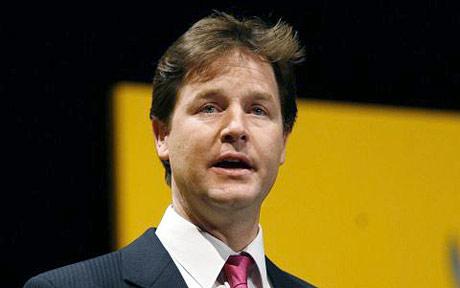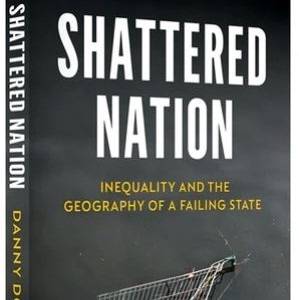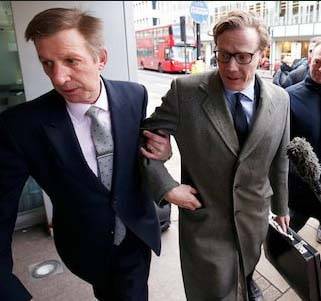
It's political conference season, and every year the three leaders give set-piece speeches designed to wow the party faithful - and the watching media. In the first of a series of posts, linguist Johnny Unger analyses how Nick Clegg, the Liberal Democrat leader and deputy prime minister, used rhetoric to persuade his listeners.
Many of the rhetorical "tricks" used by Clegg are not at all surprising - they are found in almost every political speech given in the past 2000 years. The reasons for this are simple: 1) these tricks work, they persuade audiences that what the speaker is saying is true, good, less bad than feared, etc. and 2) speechwriters study rhetoric too.
So, some of the tricks we're likely to see in all three leaders' speeches are:
- Attempts to involve the audience (both those in the room and those watching later/at a distance). The pronoun "you" is used to make listeners feel they are being directly addressed (Clegg mentioned "answering your questions online"), while "we", as in "we LibDems" is used to create to create an "in-group", to create solidarity with listeners. Clegg is also very good at using body language to involve individual audience members (frequent mentions of Miriam Clegg and others sitting in the hall) make it appear he is engaged in a dialogue, not just "speaking at" the TV cameras.
- 3-part lists: Tony Blair was famous for these ("Education, education, education" was one of his less varied examples), but Clegg can hold his own, e.g. saying he was an internationalist "first by birth, then by marriage [smile at Miriam], but above all by conviction"
- Numbers: large numbers are frequently used to legitimise arguments in politics - Clegg talked about millions of apprentices, billions given to business. Just hearing a large number may persuade audiences that something good or important is happening.
- The elderly, mothers, pupils, children: these supposedly "vulnerable" groups make frequent appearances in political speeches, even when the argument has little to do with them specifically. These can sometimes be seen as unjustified appeals to compassion and empathy, in order to make an argument more convincing or a claim more palatable. In this case, Clegg was also talking about children (free school meals), but he also used children to support his arguments in other parts of the speech.
- Personal stories: Politicians love using stories (supposedly) from their own lives, their childhoods, their family histories. Clegg took full advantage of this technique, bringing his parents, grandparents and children in at several points. This creates empathy because it frames the speaker as somebody's child or parent, something almost everyone can relate to.
- "The British People": this unspecified, undifferentiated mass of people is often used in arguments that "make sense to everyone", that "nobody could disagree with". Clegg mentions them several times. This is what linguists call a "metonomy", where one thing stands for another (in this case, all British people for some British people) and is also a fallacy in classical rhetoric: argumentum ad populum (appeal to the masses)
- Straw men fallacies: Clegg frequently starts his claims using "Labour would say", "If the Tories had…" etc. These are often the beginning of a straw man fallacy, in which the speaker distorts the claims or arguments of the opponents, in order to then more easily refute something else they have claimed.
- Use of rhythm and intonation: Clegg uses a whole series of "nightmare scenarios", in an alternative past where the Conservatives ruled alone. Each of these is followed by a "No", climaxing in an emphatic "No, no and no". He is answering his own questions, but this kind of "call and response" structure is frequently found not only in political speeches but also in sermons.
- Casual, informal style: Clegg is "one of the people", using phrases like "have a guess. Yep, the environment". This is pretty much standard for politicians since the 80s (or even earlier), but an come across as fake if the speaker is not convincing (Cameron is often accused of this).
- Empty signifiers: terms like "community" and "democratic choice" have lost almost all meaning in politics - they are impossible to argue against.
There are some further features that may take a rather different form in the speeches of the other leaders, though the basic rhetorical principles are likely to occur:
- Metaphors: Clegg's speech was full of metaphors of direction and place, like "centre of government", "between right and left", "there's no turning around", "stuck in the Westminster bubble" etc. These are very versatile and very common, and can be used to subtly suggest comparisons with good (or bad) things. They generally support the LDs' current strategy of portraying themselves as the "safe" middle between "extreme" Tories & Labour. Clegg also builds up an elaborate metaphor about walls - he mentions the Berlin Wall early on, drawing parallels between the Cold War and pre-LibDem politics. He then returns to the wall in his references to Scotland, suggesting that proponents of independence were building a wall between countries. He also uses a family metaphor in his comments on Scotland, talking about "the UK family" and "part of a family of nations". At the beginning of the speech, he recalls "preparing to unshackle Britain" - this metaphor evokes images of slavery, servitude. Unshackling is always a good thing, therefore the LibDems must be good, or so an unreflective listener might think.
- The victim card: Clegg's portrayal of his critics as nasty, unreasonable, and vitriolic engenders sympathy in the audience and legitimises his actions (as a proportionate response to victimisation).
- References to time: Clegg talks about 70 years since a LD government, 200 years of battling with the Tories. Long time periods are often used to justify arguments without fully spelling them out.
- Clegg starts his speech with "Friends" - shades of Shakespeare's Julius Caesar, but also a way of creating an informal atmosphere and solidarity with his listeners.
- Clegg refers to "a bunch of Tories" - dehumanising his political opponents, and collectivising them, in stark contrast to his own, individualised personal narratives about his family.
Follow Johnny Unger on Twitter, where he'll be live-tweeting his analysis of Ed Miliband and David Cameron's speeches in the next fortnight, @johnnyunger

